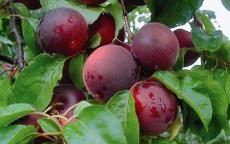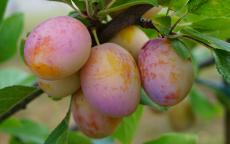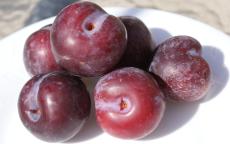Hybrid fruit trees
New fruit varieties are usually developed by crossing varieties of the same species. However new varieties can also arise from inter-breeding between varieties of different (but related) species. These are known as hybrid or inter-specific varieties.
Hybridisation is particularly common in stone fruits such as plums, cherries, and apricots. Indeed the common plum (Prunus domestica) is thought to be natural hybrid between a sloe (Prunus spinosa) and a cherry-plum (Prunus cerasifera). Although these days most hybrids are developed in university-led research programmes, they are not genetically modified (GMOs) - the process is still based on taking pollen from one variety and pollinating another in the hope of producing a new variety with the desired mix of characteristics.
Apricots are a particular focus in the development of new inter-specific fruit varieties because they naturally produce larger fruits than cherries or plums, and will easily cross-pollinate with them.
Aprikyra®
A sweet self-fertile apricot-cherry cross, also known as an Aprichery or Cherrycot- Self-fertility: Self-fertile
- Flowering group: 4
Aprisali®
A sweet self-fertile apricot - plum cross, also known as an Aprium.- Picking season: Mid
- Self-fertility: Self-fertile
- Flowering group: 3
Benita Rafzas®
Benita Rafzas is an unusual cross between an Asian and European pear.- Picking season: Early
- Self-fertility: Not self-fertile
- Flowering group: 2
Flavor King
Flavor King is a pluot (Japanese plum / apricot cross) with large sweet fruit.- Picking season: Late
- Self-fertility: Not self-fertile
- Flowering group: 1
Shipova
Shipova is a rare pear / whitebeam hybrid, producing small pear-like edible fruits.- Self-fertility: Self-fertile
- Flowering group: 4
Need more help choosing hybrid fruit trees?
See our guides and recommended collections:



